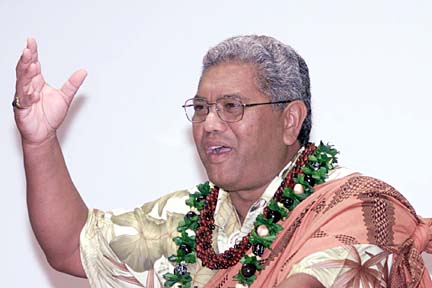
KEN IGE / KIGE@STARBULLETIN.COM
Walter Jamieson, the new dean of Travel Industry Management at the University of Hawaii, spoke last night at the annual L.W. "Bill" Lane sustainable tourism lecture on the Manoa campus.
Tourism’s cultural
role encouragedUH's new travel dean says
the industry has responsibilities
with visitors it has to accept
Sustainable tourism is more than an industry, and encompasses cultural responsibilities such as poverty reduction, said Walter Jamieson, new dean of the University of Hawaii School of Travel Industry Management.
Jamieson, in his first public speech as dean, said he has seen tourism as a powerful tool in Asia, benefiting local people, as opposed to making local people toil for the benefit of corporations.
Sustainable tourism "isn't reusing the towels in the hotel; it's much more fundamental than that," said Jamieson, who was previously vice chairman of the World Tourism Education and Research Centre at the University of Calgary in Canada.
The UH travel school will begin teaching a cultural tourism course next semester, and will sponsor a conference on the topic, to take place in May 2004, in partnership with the nonprofit Historic Hawaii Foundation, Jamieson said.
Jamieson declined to talk specifically about the tourism industry in Hawaii, saying he is too new to discuss such a complex subject, but other speakers shared their thoughts, in a lecture titled, "The Role of Tourism in Cultural Preservation and Renewal."
L.W. "Bill" Lane Jr., contributor to the UH travel school and former U.S. ambassador to Australia and Nauru, had simple words for the industry: Don't kill the goose that lays the golden eggs.
KEN IGE / KIGE@STARBULLETIN.COM
Clifford Naeole, cultural adviser to the upscale Ritz-Carlton Kapalua hotel on Maui, said the sight of big-box retailers shortly after visitors step off planes can be a turn-off.
Hawaii's environment, as a concept, embodies the health and satisfaction of those who work in the industry, as well as the local culture and the warmth of the Aloha spirit, Lane said.
"The industry needs to realize that they are the guest in the home of the host, not the other way around," said Clifford Naeole, cultural adviser to the upscale Ritz-Carlton Kapalua hotel on Maui, and longtime tourism industry figure.
The industry needs to provide a Hawaiian experience, which encourages housekeepers and bartenders to chat with guests and share their culture, in addition to the isle tourist staples of luaus, golf and tennis, Naeole said.
Naeole's comments follow a recent state report that faulted elements in the local visitor industry for distorting Hawaiian culture.
Culture should not be treated as a commodity in the tourism industry, but it is happening in the world, Jamieson said. To adopt a model of sustainable tourism, the industry must make momentous changes in its entire approach, he said.
On a note of urgency, Jamieson talked of his travels in developing Asian locales, including the ancient town of Luang Prabang in Laos. Jamieson displayed pictures of main streets, filled with souvenir shops and plastic chairs. "This is a jewel that could be lost to us very quickly," he said.
Naeole said that the first thing Maui visitors see after driving off from Kahului Airport is the horde of mainland retail chains -- the same site one sees everywhere else in America.
People come here to discover and rediscover Hawaii, and seeing big-box retailers makes visitors want to head to their resort all the more quickly, Naeole said.

